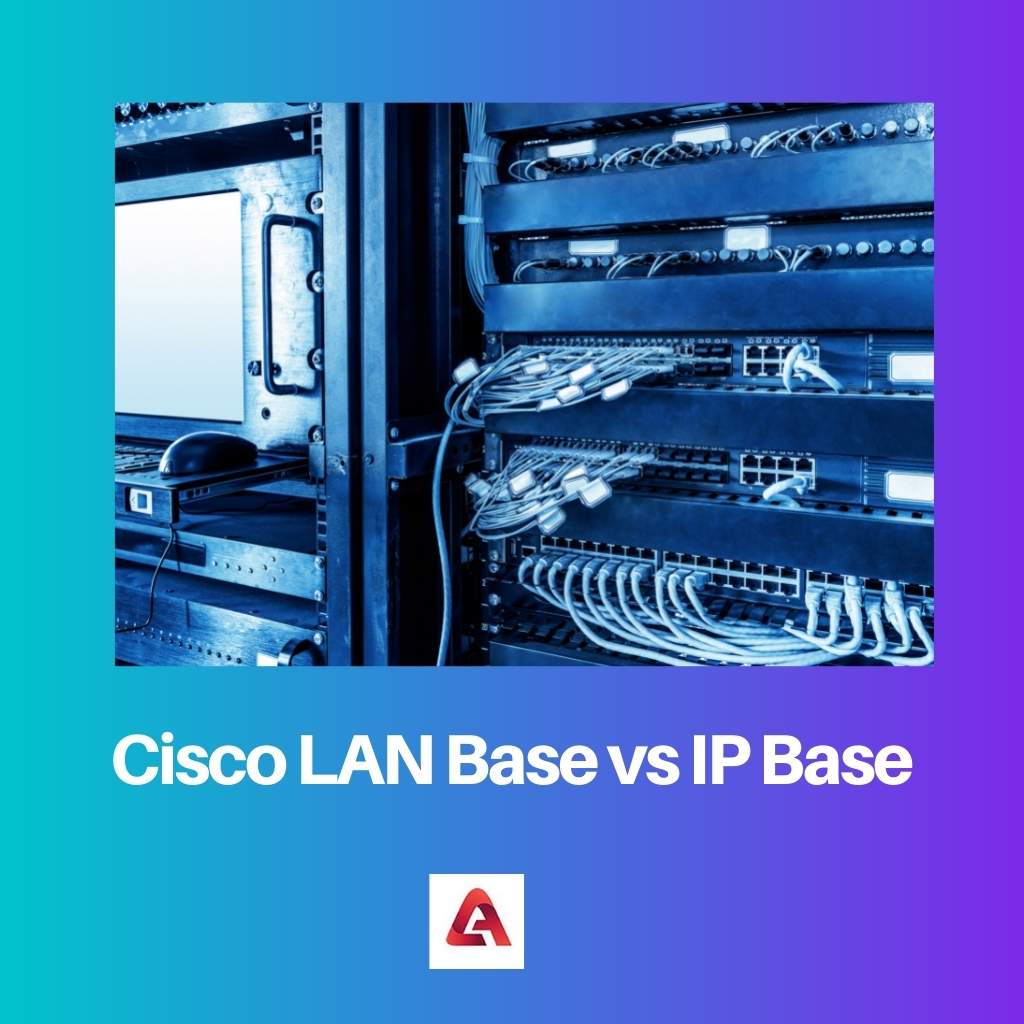They are made for Layer 2 and Layer 3 switching, which is quite a trend these days among those who use Cisco switches.
Key Takeaways
- LAN Base is a feature set tailored for basic data connectivity and network management, suitable for smaller networks.
- IP Base offers advanced routing, security, and management features, aimed at medium to large networks.
- Upgrading from LAN Base to IP Base requires a software license, providing access to more sophisticated capabilities.
Cisco LAN Base vs IP Base
Cisco LAN Base is a strong license that is used for layer 2 access switches and reliant on layer 2 static routing, making it suitable for small and mid-sized businesses. Cisco IP Base is a license that includes layer 2 static routing and layer 3 dynamic routing, mostly used in large organizations.

It was more powerful and had extra features, including VTPv3 and Flex Links. Moreover, it provides ingress policing, AutoQoS, and DSCP mapping as well.
IP Base is meant to be used by large enterprises, particularly those that are on the metro net or have more than one office.
Comparison Table
| Parameters of Comparison | Cisco LAN Base | IP Base |
|---|---|---|
| Scale | Cisco LAN Base is a good choice for businesses running on a small to medium scale. | IP Base is the perfect choice for large enterprises that have more than one office. |
| Security | Cisco LAN Base provides Enterprise Access Security when used. | IP Base provides Complete access security which enables overall network security. |
| Layer 2 | Cisco LAN Base is majorly reliant on layer 2 static routing. | IP base provides support for layer 2 routing. |
| Layer 3 | Cisco LAN Base has very few options for layer 3 dynamic routing. | IP Base is fully featured for layer 3 dynamic packet routing. |
| QoS | Cisco LAN Base has options for Ingress Policing, Trust Boundary, AutoQoS as well as DSCP mapping. | IP Base provides support for all Cisco Catalyst 2000 and 3000 QoS features which also includes per-VLAN. |
What is Cisco LAN Base?
Cisco LAN Base is a very strong license that is used for layer 2 access switches. It is an upgrade to LAN Lite as it has more powerful access features.
VTPv3 and Flex Links are two robust features that have a lot of importance in the Cisco LAN Base. If an administrator wants to have better administrative control over the VLAN topology sharing, VTP version 3 is an excellent choice.
When we talk about options for better manageability, Cisco LAN Base also provides options for MIBs, Trust Boundary, Ingress Policing, DSCP mapping, and AutoQoS.
Cisco LAN Base is a good choice for small to medium-scale businesses. It works best for companies that have a single office with a single network.
What is IP Base?
IP Base can be looked at as an advanced version of Cisco LAN Base. IT has additional features and enables better quality of service.
Some of the functions that are included in IP Base are advanced quality of service (QoS), access control lists, rate limiting, and much more.
IP Base enables complete access security and identity for Router and VLAN ACLs as well as private VLANs. It provides additional security to a device as it is compliant with TrustSec SXP and IEEE 802.1AE standards.
Main Differences Between Cisco LAN Base and IP Base
- Cisco LAN Base does not inherently support layer 3 routing without additional support, whereas IP Base provides fully featured layer 3 dynamic packet routing options.
- Cisco LAN Base is not as powerful, robust, and advanced as IP Base.
- https://books.google.com/books?hl=en&lr=&id=CN5MWZddE0QC&oi=fnd&pg=PR15&dq=cisco+lan+base+vs+ip+base&ots=Q7esmOtat6&sig=JK7mwyZjzSqPhjPSXUaLEK_S-eQ
- https://ieeexplore.ieee.org/abstract/document/7354481/

This article is perfect for understanding how businesses of different scales can benefit from Cisco LAN Base and IP Base. Great read!
Absolutely, the information here is essential for network management in various organizations.
Definitely! The details provided here can assist in making well-informed decisions regarding network infrastructure.
A comprehensive comparison of both Cisco LAN Base and IP Base, along with their scalability and security measures.
This content is extremely enlightening, especially when it comes to understanding the key differences between Cisco LAN Base and IP Base.
The features of IP Base described here are extremely beneficial and practical for large enterprises.
The comparison table provides a clear understanding of the parameters used to differentiate between Cisco LAN Base and IP Base.
It’s fascinating to learn about the robust features of Cisco LAN Base, making it an ideal choice for small to medium-scale businesses.
Absolutely, the detailed comparison aids in grasping the capabilities of each option effectively.
This article provides an in-depth comparison between Cisco LAN Base and IP Base, and the different uses of each. Very informative!
Yes, I agree. It’s an excellent job on detailing the differences between the two.
This article logically presents the distinction between Cisco LAN Base and IP Base, allowing readers to assess their suitability based on their organizational needs.